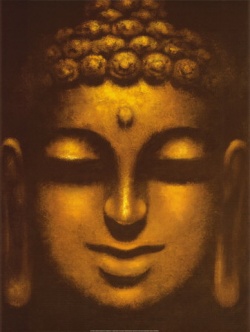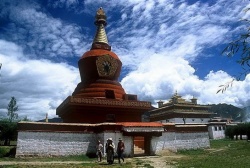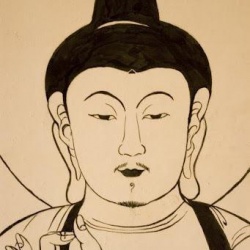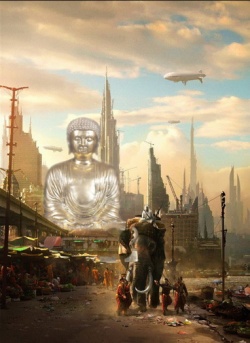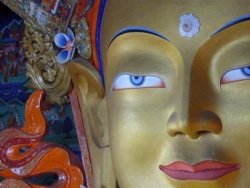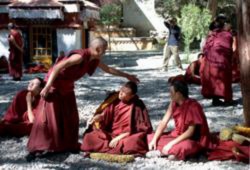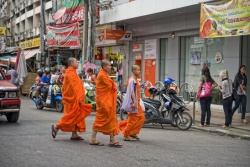Difference between revisions of "Tzu Chi"
m (Text replacement - "universal love" to "universal love") |
|||
| Line 30: | Line 30: | ||
== [[Buddhism ]]== | == [[Buddhism ]]== | ||
| − | The [[teachings of the Buddha]] and founder [[Master]] [[Cheng Yen]] play a core role in the workings of the [[organization]]. [[Tzu Chi]] promotes many of the [[life]] lessons that can be learned from [[Buddhism]], but maintains a strict policy of not proselytizing the [[religion]] itself in its public [[activities]]; members of any [[religious]] [[belief]] are welcomed to maintain their [[religious]] [[belief]] [[without discrimination]]. Tzu Chi's use of [[Buddhist principles]] is emphatically not evangelical, but rather largely focused on analyzing [[human nature]], encouraging and nurturing a {{Wiki|community}} of | + | The [[teachings of the Buddha]] and founder [[Master]] [[Cheng Yen]] play a core role in the workings of the [[organization]]. [[Tzu Chi]] promotes many of the [[life]] lessons that can be learned from [[Buddhism]], but maintains a strict policy of not proselytizing the [[religion]] itself in its public [[activities]]; members of any [[religious]] [[belief]] are welcomed to maintain their [[religious]] [[belief]] [[without discrimination]]. Tzu Chi's use of [[Buddhist principles]] is emphatically not evangelical, but rather largely focused on analyzing [[human nature]], encouraging and nurturing a {{Wiki|community}} of universal love around the [[world]], cleaning one's [[heart]] of [[hatred]], and {{Wiki|practical}} suggestions to improve one's {{Wiki|behavior}} around other {{Wiki|individuals}} to help create a [[sense]] of family-like [[love]] throughout the [[world]], irrespective of {{Wiki|individual}} [[beliefs]] and {{Wiki|political}} [[views]]. |
In {{Wiki|disaster}} regions where a particular [[religious]] [[faith]] is prominent, [[Tzu Chi]] regularly works together with local [[religious]] organizations. [[Tzu Chi]] has even gone so far as to re-build mosques and churches in {{Wiki|disaster}} zones where [[faith]] plays an important role in local [[society]]. | In {{Wiki|disaster}} regions where a particular [[religious]] [[faith]] is prominent, [[Tzu Chi]] regularly works together with local [[religious]] organizations. [[Tzu Chi]] has even gone so far as to re-build mosques and churches in {{Wiki|disaster}} zones where [[faith]] plays an important role in local [[society]]. | ||
Every year, on the second [[Sunday]] of May, [[Buddha's Birthday]] and Mother's Day (as recognised in [[Taiwan]]) coincide, forming the so-called "[[Tzu Chi]] Day". Usually on [[Buddha's Birthday]], [[Buddhists]] bathe the [[Buddha]] but [[Tzu Chi]] believes that it is the [[people]] that needs cleansing to be able to be good {{Wiki|individuals}}. | Every year, on the second [[Sunday]] of May, [[Buddha's Birthday]] and Mother's Day (as recognised in [[Taiwan]]) coincide, forming the so-called "[[Tzu Chi]] Day". Usually on [[Buddha's Birthday]], [[Buddhists]] bathe the [[Buddha]] but [[Tzu Chi]] believes that it is the [[people]] that needs cleansing to be able to be good {{Wiki|individuals}}. | ||
Latest revision as of 10:05, 29 January 2016
The Tzu Chi Foundation or Tzu Chi, literally "Compassionate Relief", is an international humanitarian organization and the largest non-governmental organization (NGO) in the Chinese-speaking world with a special consultative status at the United Nations Economic and Social Council. The organization was founded by Dharma Master Cheng Yen, a Buddhist nun, on May 14, 1966 in Hualien, Taiwan. She was inspired by her master and mentor, the late Venerable Master Yin Shun (印順導師, Yìn Shùn dǎoshī), a significant proponent of Humanistic Buddhism, who exhorted her to: "work for Buddhism and for all sentient beings." In mountainous Hualien, Master Cheng Yen was moved to act by the poverty and lack of services, and decided to set up a charity organization. The endeavor began as a group of thirty housewives who set aside a small amount of their grocery money each day to care for needy families. From these humble beginnings, the group has grown to become a major civil society actor, with approximately 10 million members, and chapters in 47 countries. The group's core activities span Charity, Medicine, Education and Humanistic Culture, and it provides aid to all people regardless of race, religion or nationality. With particularly deep roots in Asia, Tzu Chi is considered one of the most effective aid agencies in the region. Tzu Chi conducts its mission via an international network of volunteers. They are easily recognized by their blue and white uniforms, and Tzu Chi relief workers have been called "blue angels" for this distinctive appearance. Tzu Chi volunteers often refer to their uniforms as 藍天白雲 (lántiān báiyún, lit. 'blue sky, white clouds').
Tzu Chi Foundation also has the Tzu Chi Collegiate Youth Association (慈濟大專青年) or Tzu Youth (慈青) in short. They actively do the four missions of Tzu Chi especially charity work. They also promote vegetarianism make the youth generation be aware of world issues and environmental protection. Tzu Chi has several sub-organizations, such as the Tzu Chi International Medical Association (TIMA), composed of medical profession personnel who travel overseas to volunteer their services in poor communities without access to medical care and during international disaster relief. As a non-profit organization, Tzu Chi has built many hospitals and schools worldwide, including a network of world-class medical facilities in Taiwan and a comprehensive education system spanning from kindergarten through university and medical school. Schools were also rebuilt in the aftermath of earthquakes in Iran, China and Haiti. The organization maintains a small number of nuns, who are self-sufficient, including growing their own food.
Contents
Mission
While the Tzu Chi Foundation has Buddhist origins and beliefs, the organization is also popularly known for its selfless contributions to society in numerous ways in the areas of Charity, Medicine, Education, and Culture. The official motto, or concept behind Tzu Chi Foundation is the (四大志業,八大腳印), which means, "Four endeavors, eight footprints". The eight footprints are charity causes, medical contributions, education development, humanities, international disaster assistance, bone-marrow donation, community volunteerism, and environmental protection. An excerpt from the Official Tzu Chi Global Website, says the following:
We work in missions of Charity, Medicine, Education and Culture with the spirit of sincerity, integrity, trust, and honesty. We believe in the equality of all beings and the Buddha-nature potential in every person. Through charitable hearts, the privileged obtain blessings and joy, and the impoverished receive security and peace.
Activities
While many Buddhist societies are devoted to personal enlightenment and meditation, Tzu Chi focuses on community service and outreach; specifically, case management, medical, educational and disaster relief. Tzu Chi has built and operates many hospitals and schools. The organization's outreach efforts range from visits to nursing homes to providing bone marrow surgery, as well as offering items such as washing machines to struggling single mothers. Tzu Chi operates its own television channel, "Da Ai" network, along with its own news and television programming. It has also established Chinese schools abroad, such as in Australia and the US, which teach not only Chinese and sign language, but also the ways of compassion and community service. In the aftermath of Hurricane Sandy, the organization announced on November 18, 2012 that it was able to donate $10 million dollars in the form of $300 and $600 Visa debit cards to those affected in the New York City area. Volunteers handed out these cards in parts of Brooklyn, Queens, and Staten Island.
Recycling
Tzu Chi works towards environmentally friendly goals and encourages recycling of items such as water bottles, and encourages using reusable items or reusing items to reduce waste. The foundation operates over 4,500 recycling stations throughout Taiwan. One of the foundation's projects is the recycling of polyethylene terephthalate (PET) plastic bottles for textiles. The project, which was started in 2006, collects PET plastic bottles, rinses and shreds them, and then converts the shreddings into polyester resin, which is spun into yarn and woven into cloth. As of September 2008, some 11,856,000 bottles were used to make more than 152,000 polyester blankets, many of which have been distributed as part of Tzu Chi's disaster relief programs. Other items made with the recycled resins include thermal underwear, t-shirts, hospital bed sheets, medical gowns and uniforms for Tzu Chi volunteers.
Buddhism
The teachings of the Buddha and founder Master Cheng Yen play a core role in the workings of the organization. Tzu Chi promotes many of the life lessons that can be learned from Buddhism, but maintains a strict policy of not proselytizing the religion itself in its public activities; members of any religious belief are welcomed to maintain their religious belief without discrimination. Tzu Chi's use of Buddhist principles is emphatically not evangelical, but rather largely focused on analyzing human nature, encouraging and nurturing a community of universal love around the world, cleaning one's heart of hatred, and practical suggestions to improve one's behavior around other individuals to help create a sense of family-like love throughout the world, irrespective of individual beliefs and political views. In disaster regions where a particular religious faith is prominent, Tzu Chi regularly works together with local religious organizations. Tzu Chi has even gone so far as to re-build mosques and churches in disaster zones where faith plays an important role in local society. Every year, on the second Sunday of May, Buddha's Birthday and Mother's Day (as recognised in Taiwan) coincide, forming the so-called "Tzu Chi Day". Usually on Buddha's Birthday, Buddhists bathe the Buddha but Tzu Chi believes that it is the people that needs cleansing to be able to be good individuals. Tzu Chi also has sutra adaptations on the Sutra of the Innumerable Meanings and on the Sutra of the Water Repentance through the use of sign language. The Sutra of the Innumerable Meanings tell people that time is running out and there will be disasters if people do not stand for a change. The Sutra of the Water Repentance, on the other hand, tell people that they need to repent their wrongdoings.
Tzu Chi logo
Simultaneously bearing the lotus fruit and flower, the Tzu Chi logo symbolizes that we can make the world a better place by planting good seeds. Only with these seeds can the flowers bloom and bear fruit. A better society can be created with good actions and pure thoughts. Ship: Tzu Chi steers a ship of compassion to save all beings that suffer. Eight Petals: The petals represent the Noble Eightfold Path in Buddhism that Tzu Chi members use as their guide. The Noble Eightfold Path:
- Right View
- Right Thought
- Right Speech
- Right Behavior
- Right Livelihood
- Right Effort
- Right Mindfulness
- Right Concentration
Work in China
Due to the organization's apolitical stance, Tzu Chi has been carrying out charity work in China. Tzu Chi's involvement in the People's Republic of China began in 1991, when it undertook relief operations after severe floods hit central and eastern China. Since then, the group has built schools, nursing homes and entire villages, including infrastructure in poor inland areas, such as Guizhou province. In carrying out these projects, Tzu Chi volunteers abide by the rules of "No politics, no propaganda, and no religion." Over the past twenty years, 28 provinces, municipalities and autonomous regions in China have received aid from Tzu Chi. This aid has taken many forms, including infrastructure projects (such as rebuilding schools and villages after the Sichuan earthquake and installing water cisterns in Gansu and Guizhou provinces); relief work in poverty-stricken areas and winter-time distributions of rice, cooking oil, blankets and jackets; social programs, such as home visits to the needy and providing scholarships to low-income students; medical missions, such as bone marrow donation and free clinics; and promotion of environmental protection and recycling. In March 2008, Tzu Chi became the first organization represented by a non-Mainland resident to be registered with the Chinese government. That year also marked a watershed moment for humanitarian work in China. In the aftermath of the devastating 2008 Sichuan earthquake, Tzu Chi immediately sent food, blankets and medical aid to survivors, while volunteers in China set out for the disaster zone. Tzu Chi was also one of the few organizations the Chinese government allowed to bring in aid workers from overseas to join the relief effort. With the motto "First to arrive, last to leave," the organization has continued with long-term reconstruction work in Sichuan, and by 2010, had rebuilt thirteen schools in the region. After many years of quiet but sustained work, in August 2010, Tzu Chi became the first overseas NGO to receive permission from the Ministry of Civil Affairs to set up a nationwide charity foundation. (Normally, overseas organizations must register with the Ministry of Commerce as businesses). The foundation received the China Charity Award from the Ministry of Civil Affairs for its work in promoting the well-being of society and relieving the suffering of the needy in 2006 and again in 2008. Master Cheng Yen has continued calling for building a "Bridge of Love" between China and Taiwan, believing that Great Love transcends all national, religious and racial boundaries.
Youth Branches
The Tzu Chi Collegiate Association (慈濟大專青年聯誼會) is the Foundation's youth organization, and was officially established in Taiwan on May 31, 1992. With chapters at universities worldwide, it allows university students (known as Tzu Ching or 慈青) to be involved with Tzu Chi's work in their own communities and internationally. Many Tzu Ching volunteers are given the opportunity to participate in large scale events such as international disaster relieves and international NGO conferences as such the annual UN Youth Assembly. The founder Master Cheng Yen encouraged the Tzu Ching volunteers to actively communicate with each other to learn and improve. Each year an international Tzu Ching officer training retreat camp is held in Hualien, Taiwan, the origin of the foundation. Tzu Shao (慈少) is the branch of Tzu Chi for youths 18 and younger.
